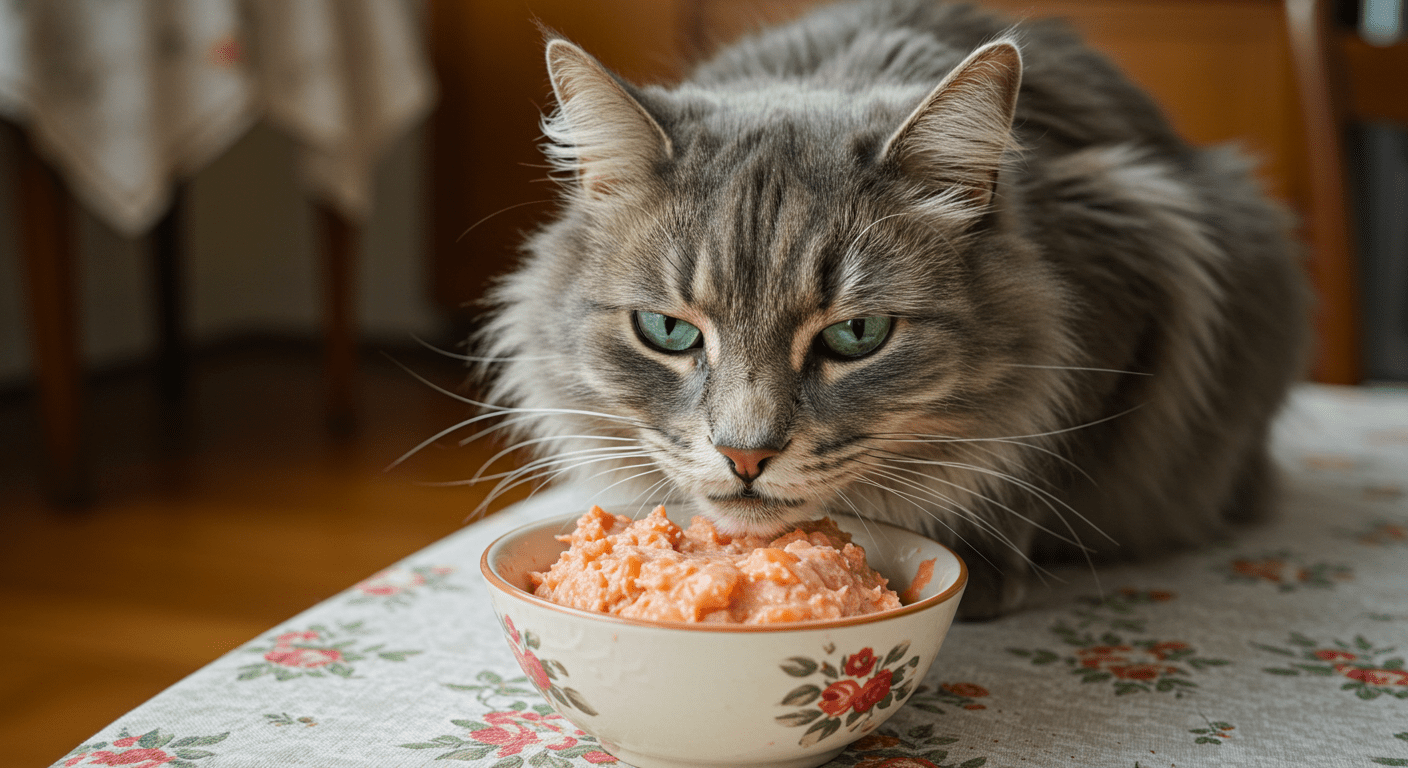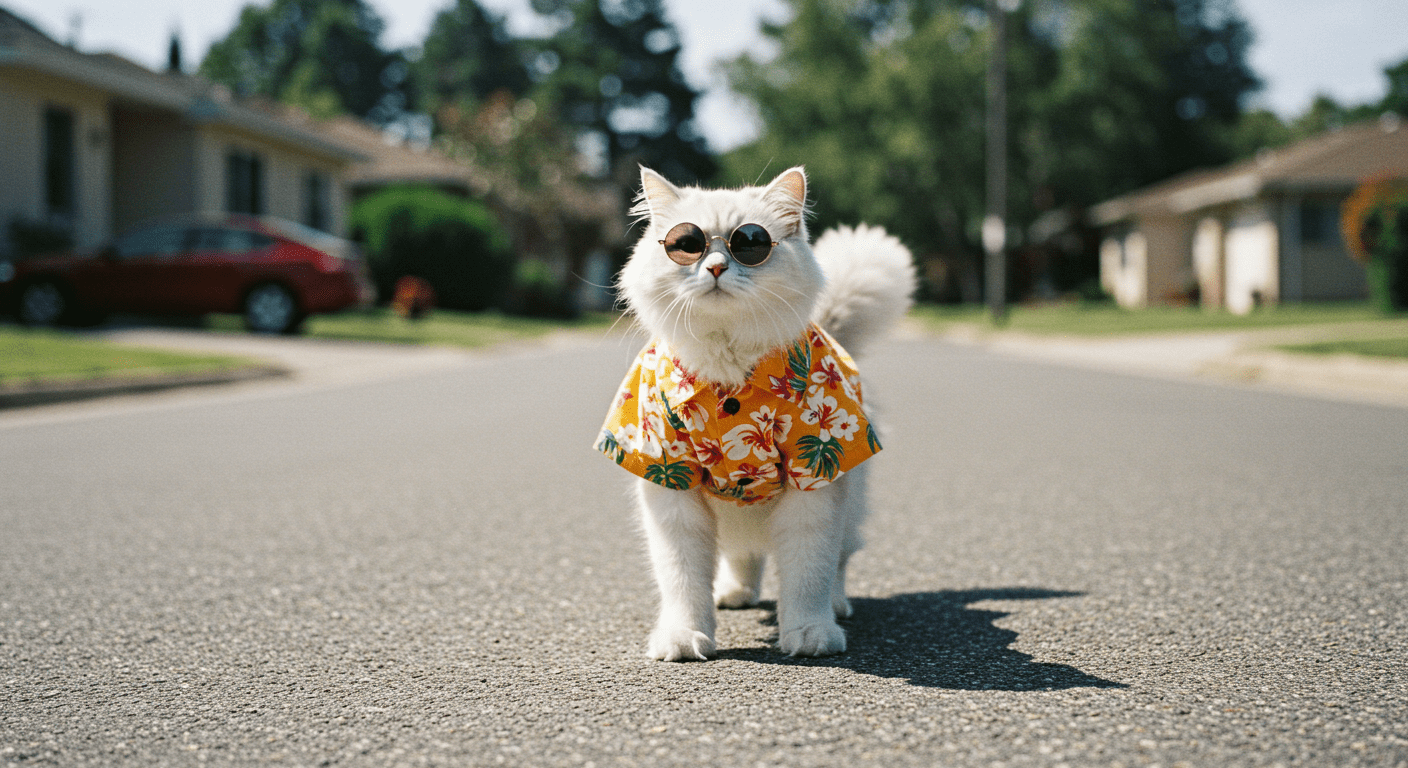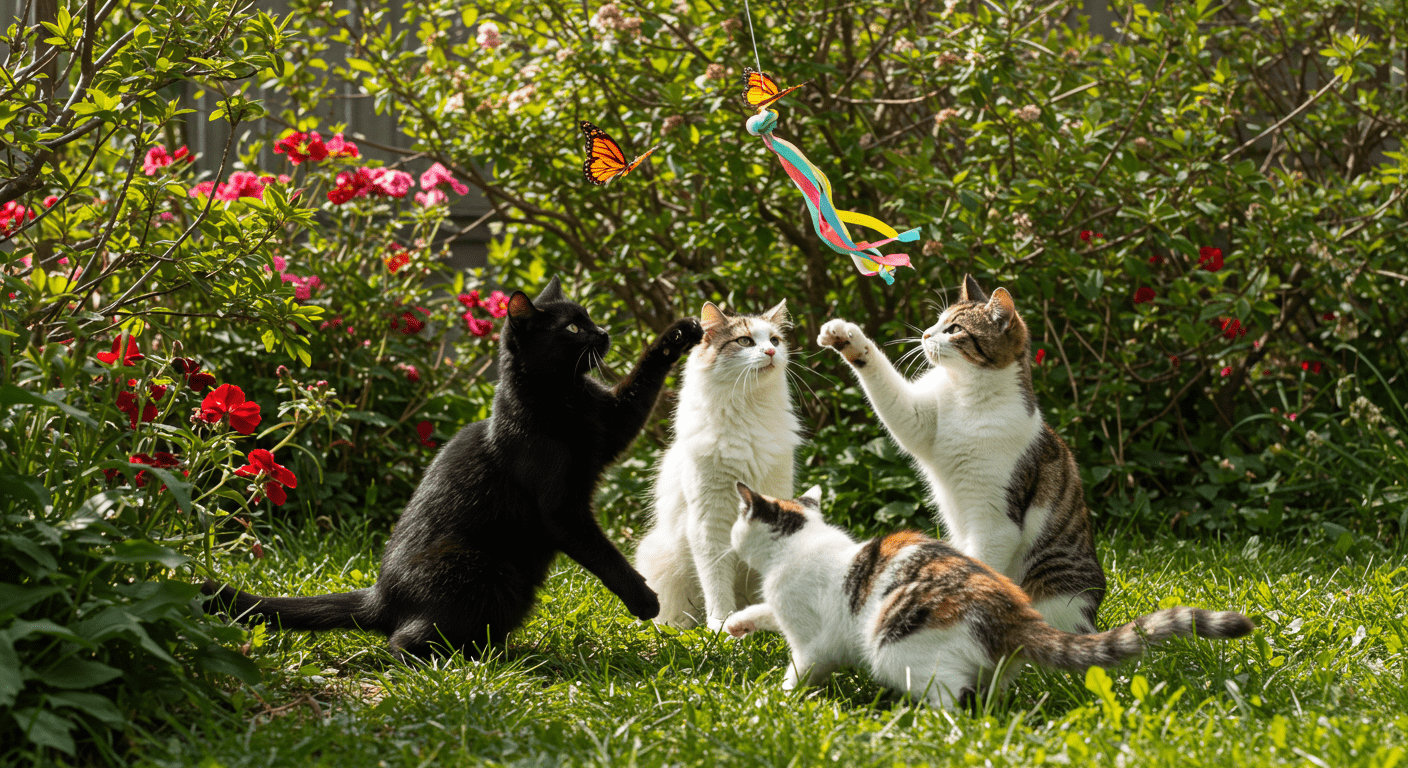As our beloved cats become older, they frequently become the wise old sages of the home, with strange behaviors and more naps than they used to take. It's impossible not to smile when you see your older cat lying in a sunshine, looking like a queen on her throne. But let's be honest: caring for older cats has its own set of problems and rewards. Here we will cover everything from health issues to enjoyable things to do with our beloved cats as they get older and more graceful.
Top Takeaways and Key Concepts
- Schedule vet visits every 6–12 months to catch health issues early.
- Feed high-protein, low-calorie meals with real meat as the first ingredient.
- Control portions and limit treats to prevent obesity and related diseases.
- Create cozy, low-level resting areas and easy-access litter boxes for comfort.
- Keep your senior cat active with gentle play and puzzle feeders for stimulation.
Summary:
As cats age, their care needs evolve—requiring extra attention to health, diet, comfort, and activity. Regular veterinary visits are essential for detecting problems like kidney disease or arthritis early. Nutrition should focus on lean protein, fewer calories, and portion control to avoid obesity. A comfortable home setup with soft bedding, accessible litter boxes, and varied scratching posts helps maintain mobility and confidence. Mental and physical stimulation through gentle play, interactive toys, or puzzle feeders keeps older cats engaged and happy. With proactive vet care, thoughtful nutrition, and a cozy environment, senior cats can thrive gracefully in their golden years.
Video Summary
Jump to Content
Understanding Your Senior Cat's Health Needs
Please Note: This post may contain affiliate links. If you click one of them, we may receive a commission at no extra cost to you. As an Amazon Associate, I earn from qualifying purchases.
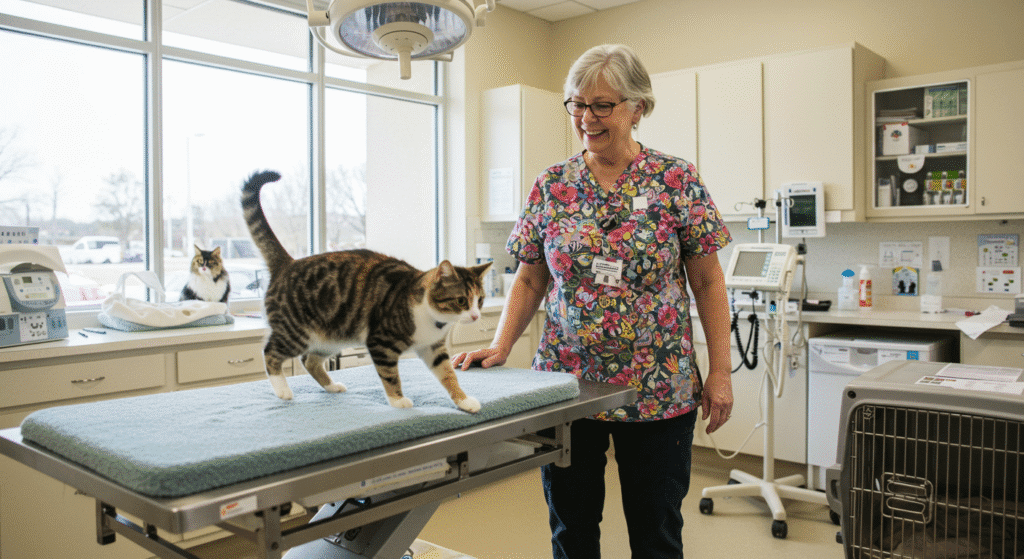
Senior cats may have a penchant for napping, but they also possess an uncanny ability to strategically ignore any health advice you give them—like a furry little rebel. They’ll act like they’re perfectly fine until it's time for the vet visit, at which point they suddenly develop a mysterious case of “I’m not feeling so great” right when it’s time to leave the house.
“Cats are the ultimate narcissists. You can tell by just looking at them.” — James Gorman
One of the most important things to remember when taking care of an elderly cat is that their health demands alter over time. Cats, like people, go through a lot of bodily changes as they become older. You might see them slow down or lose interest in their favorite toys, the ones they used to pounce on like a lion chasing its prey.
At this point, regular visits to the vet are quite important. I all, who doesn't love going to the vet? (Okay, maybe not.) But really, these exams help spot problems early on, such dental issues or kidney illness, which are frequent in older cats. Blood tests and urine tests can tell you a lot about your pet's health and help your vet suggest any changes to their diet that may be needed.
Fun Feline Facts: Understanding Your Senior Cat's Health Needs
– Purrfectly Lazy: Senior cats often sleep up to 20 hours a day, which means they’re basically professional nappers—just like your favorite couch potato!
– Whisker Wisdom: Older cats have longer whiskers than younger ones, helping them navigate their surroundings. Think of it as their personal GPS system—“Whisker Positioning System,” if you will!
– Senior Snack Attack: Cats can develop a taste for gourmet cat food in their golden years. So don’t be surprised if your once-picky eater suddenly demands the “fancy feast” like a feline foodie!
Another important thing you can do to make sure your senior cat has a long and healthy life is to help them keep their weight in check. Your kitty could grow less active and acquire weight faster than you can say “treats” as she gets older. You could see her lying about more regularly, trading in her energetic zoomies for long, relaxing sunbathing sessions on the windowsill. It's cute, but if you don't take care of it, it could cause some health problems that aren't so cute.
Watching what she eats can help her stay at a healthy weight and avoid difficulties that come with being overweight. Cats that are overweight don't simply appear fluffy; they can also get diabetes, arthritis, and heart disease. No one wants their pet cat to have to deal with these problems when they may be avoided with a little care about what they eat! So, what's the plan?
Handy Amazon Shopping Directory for Cat Supplies
Cat Food - Cat Toys - Cat Health - Grooming - Carriers - Cat Beds - Apparel
Furniture - Cat Doors - Collars - Feeding/Watering - Flea/Tick Control - Treats
First, be sure to check the labels on your food carefully. What looks like just another bag of kibble could have extra calories in it! A lot of store-bought cat feeds include fillers in them that don't help your cat's health and add extra calories. Instead of imprecise words like “meat by-products,” look for high-quality components that specify actual meat as the first ingredient. We want our kitties to eat something healthy, not a mystery stew!
Another important part of keeping her weight in check is controlling her portions. I know how hard it is to stop filling that bowl till it looks like a little mountain of kibble, especially when those large eyes look up at you with sad faces! But giving too much food might soon add up to excess pounds. Instead of letting her eat whenever she wants, think about setting regular mealtimes with exact servings that are right for her. Your vet can help you figure out how much food she needs based on her age, weight, and level of activity.
Don't forget about the sweets! They are great for rewarding excellent behavior or just displaying love (who doesn't like to indulge their pet?), but you should only give them a few at a time. Instead of store-bought snacks that may be full of empty calories, look for healthier options or use pieces of cooked chicken or fish as special treats.
Adding playtime to your daily routine can help her stay at a healthy weight and build your relationship at the same time! Gentle play sessions get her moving without putting too much strain on her joints or energy levels. Toys that resemble how prey moves or games that she can play with can get her interested and get her paws moving again.
Taking care of your senior cat's weight will pay off in a big way, not just for her health but also to make sure she stays healthy and happy for many years to come!
Diet Adjustments for Aging Felines
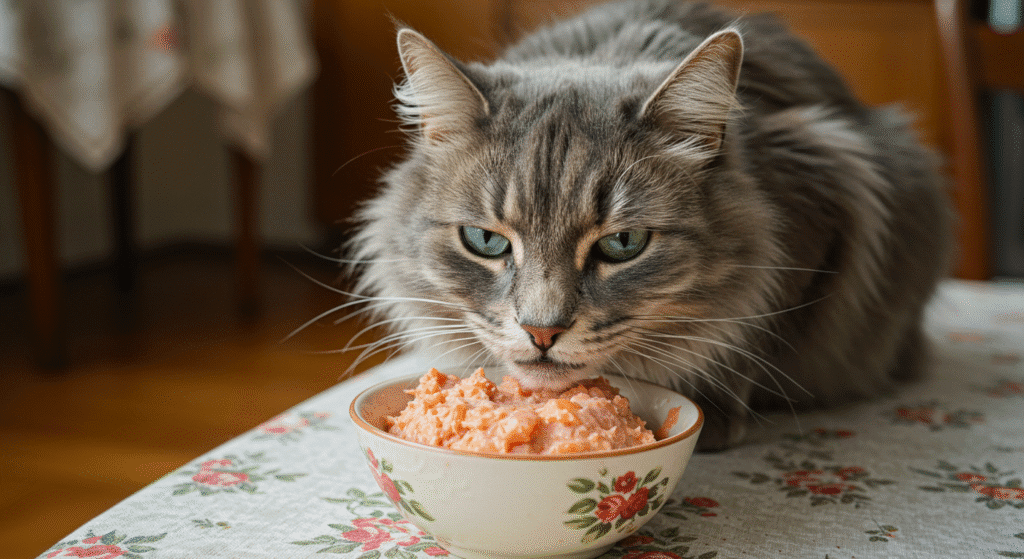
As cats age, they often develop a taste for the finer things in life, and this can lead to some rather hilarious dining habits such as turning their noses up at gourmet food while developing an inexplicable craving for your leftover pizza crusts. It’s like they think that they are sophisticated connoisseurs judging the culinary world from the comfort of their cat tree.
“Cats are connoisseurs of comfort.” — James Herriot
Let's talk more about diet now that we've talked about food. Older cats often need different nutrients than younger cats need. They need meals that are high in good protein and low in calories because they probably expend fewer calories every day while they sleep in their cozy locations.
It's important to note that some older cats may develop allergies or sensitivities that they didn't have when they were younger. This means you might have to try a lot of different brands or types of food until you discover one that your cat enjoys and that doesn't upset her stomach. Wet food can be quite helpful since it keeps them hydrated and gives them the moisture they need.
Fun Feline Facts: Diet Adjustments for Aging Felines
– Taste Buds at Play: Older cats have fewer taste buds, making them picky eaters. They might prefer their food served with a side of “I’m not sure about this” attitude!
– Fiber Frenzy: Senior cats may benefit from more fiber in their diet. It’s like giving them the secret to staying regular—who knew being a cat could be so complicated?
– Weight Watchers: As they age, many cats become couch potatoes. A proper diet helps prevent the infamous “senior spread,” turning your kitty into a fluffier version of themselves!
And then there are the yummy snacks we all love to give our cats. Honestly, is there anything cuter than a cat dancing for a treat? Those big, excited eyes as you reach for the goodie bag may make even the coldest hearts melt. Things become a little complicated here, though: moderation is crucial! It could be hard to resist giving your cat food every time she tilts her head in that cute way, but too many rewards can make her gain weight again, which is what we talked about before.
Cats have a strange capacity to find goodies from far away. One minute you're minding your own business and eating chips, and the next minute your cat is at your feet like a fuzzy ninja. When you keep giving out little bits, it's easy to forget that they pile up quickly. Like us, our cats can overeat their favorite treats, just like we could eat too many pieces of pizza (who can resist?).
Instead of throwing sweets around like confetti at a party, use them judiciously during training sessions or as rewards for good conduct. If you only give her goodies when she accomplishes something spectacular, like learning how to do the high-five trick or finally figuring out not to jump on the kitchen counter, it will make those times feel special and get her attention more efficiently. A little bit goes a big way!
When picking out sweets, think about going for low-calorie or natural ones to keep things fun and healthful. There are a lot of companies that use only healthy ingredients and don't add extra sweets or fillers. You may also try making your own cat snacks with things like chicken or tuna. Just make sure they are healthy for her to eat!
Also, playing with your cat in an interactive way might be a great way to thank them without offering them treats. You may get your pet to exercise and think without having to rely only on food rewards by using feather wands or laser pointers. Also, it's fun to watch her pounce on and chase after toys. It will make anyone's day better!
In short, it's hard not to indulge our furry friends with tasty treats, but watching how much they eat will help them stay healthy over time. We want them to be cheerful and spry, not sluggish from too many treats! So go ahead and give those sweets sparingly but with delight; they'll be much more appreciated when they're not just another thing that happens every day!
Creating a Comfortable Living Space
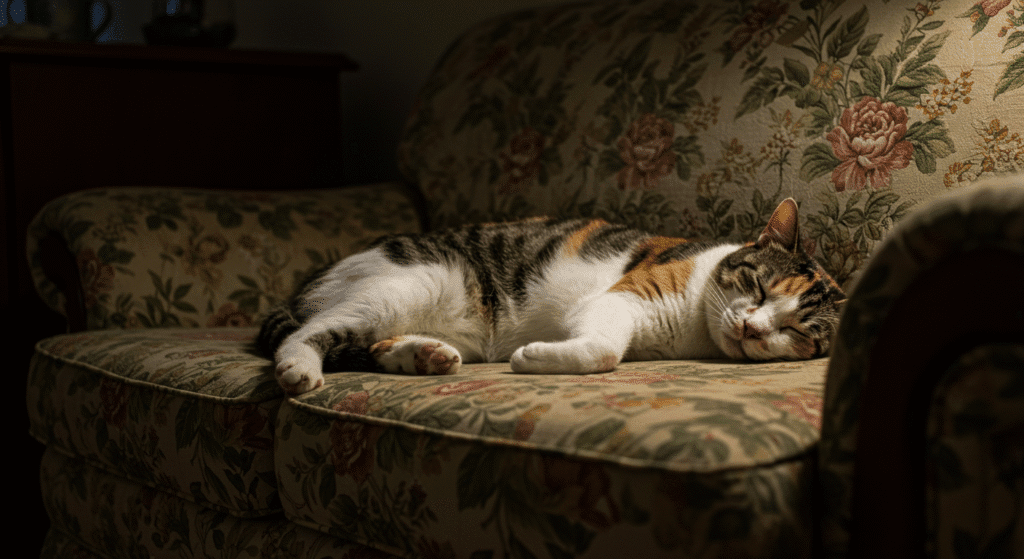
Older cats have a unique talent for finding the coziest spots in the house, often choosing the most inconvenient places—like your freshly folded laundry or that tiny sliver of sunlight on the floor—proving that comfort is their top priority, even if it means making your life a little more challenging.
“Cats are not our whole life, but they make our lives whole.” — Roger Caras
Now let’s talk about creating an inviting environment for your aging cat! As cats get older, they may struggle with mobility due to arthritis or other joint issues. So it makes sense to rethink your home layout a bit—especially if you've got stairs or slippery floors where accidents could happen.
Consider adding soft bedding options at ground level so she doesn’t have to leap onto high surfaces anymore (because let's be honest; jumping is overrated). And speaking of comfort zones—don’t forget about keeping her litter box easily accessible! No one wants an unintentional “accident” because getting up was just too much effort.
Fun Feline Facts: Creating a Comfortable Living Space for Older Cats
– Pillow Princesses: Senior cats love soft surfaces! A pile of plush pillows is basically a five-star hotel for them—just don’t be surprised if they claim the entire couch as their territory.
– Sunbeam Seekers: Older cats are expert sunbathers, often found lounging in the perfect sunbeam. It’s like they have a built-in GPS for warmth and relaxation!
– The Royal Throne: Many senior cats prefer elevated spots to survey their kingdom. Providing a cozy perch or cat tree gives them the royal view they deserve—because every cat is a king or queen at heart!
It's interesting that giving your older cat scratching poles at different heights is like giving her a gym membership, but without the high costs or unpleasant interactions with overly eager trainers! As cats get older, their talents change, so it's important to adjust their environment to keep them happy and interested. Imagine a cozy place where she can scratch to her heart's content and get some light exercise at the same time. That sounds great, doesn't it?
Cats are good at stretching. Have you ever noticed how easily they seem to do yoga poses? Stretching those muscles is very important for their health, whether it's a full-body stretch after a lengthy nap or that cute way they arch their back before a leap (even if that leap is now more of a soft hop). You may meet her shifting requirements and keep her claws healthy and happy by giving her scratching posts at varied heights. Some are high enough for a nice vertical scratch, and others are low enough for her to reach.
If you suddenly couldn't reach lofty areas, wouldn't you want to have choices? A tall post lets her really get into her claws and stretch out her back while keeping her nails naturally short. On the other hand, a lower post is great for when she wants a scratch but doesn't want to get up and do it. Plus, let's be honest: who doesn't love seeing cats twist and turn into strange shapes? It's like live entertainment!
Cats scratch not just because they like it, but also to keep their claws healthy. It helps them shed their outer covering, which keeps them from being too lengthy or brittle. This is especially crucial for elderly cats since they may not wear down their nails as easily when they are active every day. Giving your cat different things to scratch on, such sisal rope or cardboard, helps keep her claws sharp and healthy.
But scratching isn't simply for keeping your claws healthy. It also keeps her brain busy. Cats use scent glands in their paws to mark their territory, and scratching is a safe and natural way for cats to do this. Putting posts in important places, like next to her bed or in the room where you spend the most time together, can make her feel safe and sure of herself.
Change the postings every few weeks or add a new one every now and then to keep things interesting. Even little modifications make the old things seem new. You can also make your cat curious and playful by sprinkling catnip or placing a toy that hangs down.
In summary, scratching poles of varied heights help her body and mind. They help her stretch, work out, and keep comfortable in a safe way. A little change can do a lot to keep her happy and healthy.
Fun Activities for Senior Cats

Older cats often enjoy “cat yoga,” which involves stretching out in sunbeams, curling up in cozy spots, and occasionally doing the dramatic flop onto their side to signal it's time for a nap—proving that relaxation is an art form.
“I have studied many philosophers and many cats. The wisdom of cats is infinitely superior.” — Hippolyte Taine
Just because our pets are getting older, it doesn't mean that they shouldn't have fun! Fun activities are needed for their mental stimulation and emotional health – even if it is necessary to change the way we play.
Actually, interactive toys are almost a magic solution for the problem. A feather wand or a laser pointer (of course, with supervision) can be excellent since they can attract your pet's attention and encourage a gentle movement without any great acrobatics. And really? You may have to laugh when your dog is trying to catch the mysterious red dots which are racing across the floor!
Fun Feline Activities: Keeping Senior Cats Engaged
– Feather Duster Dance Party: Older cats may not be as spry, but they still love a good chase! Waving a feather toy can turn any lazy afternoon into a dance party—just watch out for the occasional dramatic flop!
– Puzzle Feeders: Turn mealtime into a fun challenge! Senior cats might enjoy figuring out how to get their treats from puzzle feeders. It’s like cat trivia night, but with snacks!
– Cuddle and Channel Surfing: Nothing beats cozy time on the couch! Grab some cat-friendly movies or nature shows; senior cats will appreciate your company while you both enjoy some “paw-sitive” entertainment together.
One more awesome alternative can be puzzle feeders packed with tasty kibble or treats that energize the mind and body of the dog and at the same time let her release the natural hunting instincts that have been stimulated – even if it is simply from the security of her blanket fort!
Finally—and this one's important—never underestimate the power of cuddles and quiet time together! Sometimes simply curling up next to each other while watching TV is all she needs for happiness—a warm presence beside hers speaks volumes about love shared between pet parents and their cherished companions.
Regular Veterinary Visits: Why They Matter
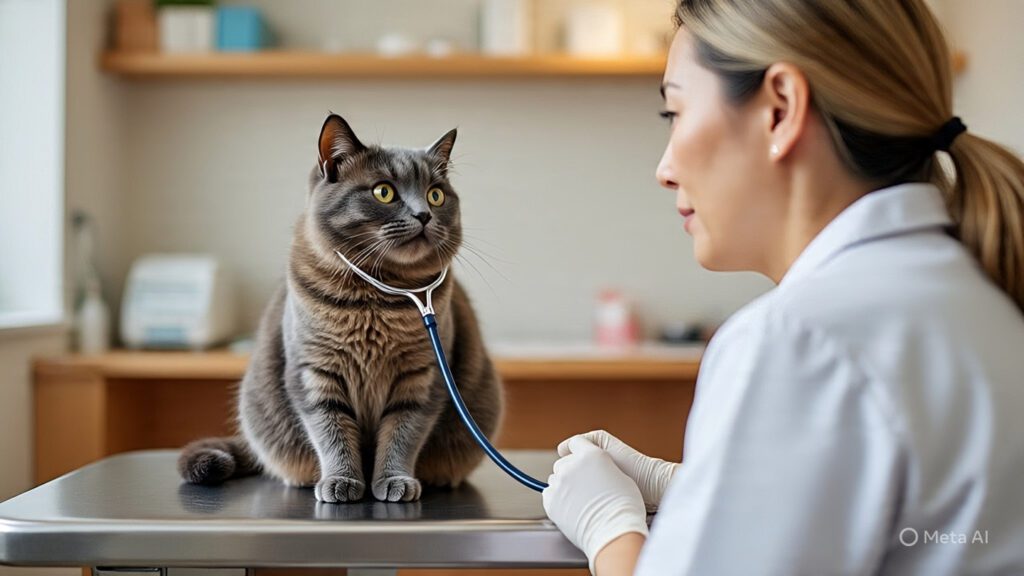
Older cats are known to have a sixth sense about vet visits; they can detect the sound of a cat carrier from three rooms away and will immediately assume the most dramatic “I’m not going” position, which often resembles an upside-down pancake.
“As every cat owner knows, nobody owns a cat.” — Ellen Perry Berkeley
We can still talk about vet visits even though they are very important during this period of life! Regular check-ups are not only good for uncovering any health concerns; they also act as a preventative measure against future health issues—a situation that is good for both sides!
During these visits, it is very important that you get the most out of your time with the vet. In fact, this is not a quick interrupt for some pampering and goodies; it is a great chance to delve into your aged cat's health and joy! If at all your pet has changed her behaviour – perhaps she has become more uncommunicative or started calling during the night – do not hesitate to mention these to the vet. Vets really appreciate it when owners are involved in pet care and are therefore proactive. It reflects how much you care and they want to help!
Fun Facts About Feline Vet Visits
– Paw-sitive Vibes: Did you know that many cats actually enjoy their vet visits? Well, at least the part where they get treats! A little bribery goes a long way in making them feel like stars.
– Whisker Wisdom: Older cats have more wisdom than you think! They can sense when it’s time for a check-up and might even remind you by giving extra cuddles—talk about subtle hints!
– Meow-nificent Milestones: Regular vet visits can help your senior cat celebrate more birthdays! Think of it as their “purr-thday” gift: a healthier, happier life filled with naps and snacks.
Think about it: our animal pets can't really tell us what's wrong. So, if your cat has been acting a little weird lately, like hiding more or not being as interested in her favorite toy mouse, these things are really important for the vet to know. They will be able to figure out how what you observe at home is related to any health problems that may need to be fixed. Just think about how much better you'll feel knowing you caught something early instead of waiting until it becomes a full-blown disaster!
Also, don't be afraid to talk about meds that are made just for elders during these visits. Older cats often need different types or amounts of medicine than younger cats. This could include pain treatment options for arthritis (because let's face it, jumping on the couch isn't as easy as it used to be) or special diets that help with weight loss or kidney function. You will be better able to make choices that improve her quality of life the more you know about the possibilities that are available.
And this is where things become really interesting: have you ever thought about other kinds of therapy? A lot of pet owners are shocked at how well acupuncture and other therapies work for their older animals. Yes, I did say acupuncture! It seems sophisticated and maybe even a little strange at first, but trust me when I say that many cats like this delicate treatment. It can aid with discomfort, make it easier to move around, and even lower anxiety—all things we want for our pets! So why not talk to your vet about it? When it comes to making sure your senior cat is comfortable, looking at several options makes sure you cover all your bases.
It's interesting that dealing with possible problems early on pays off big time! Think about how much easier it is to deal with tiny problems before they turn into big ones later on. By being proactive at the vet—asking questions and talking about your worries—you are setting yourself up for success in keeping your cat healthy over time.
Such thing as cooperating with your vet over time is a win-win situation, which is both good for you as well as your kitty. Vets adore owners who come packed with questions because it makes it easy for them to give the advice that is perfect for your pet's unique situation. After all, every cat is different! Whether it becomes a matter of diet or exercise, depending on activity levels or mobility, through a communication that is always open you have guaranteed care that is catered to your needs.
So here is the thing; next time you’re at the vet’s with your senior cat—and let’s be honest, those visits can sometimes feel like you’re in a “Survivor” episode—just pledge the following to memory: showing up with ready questions and taking keen observations of your cat’s behavior will change the whole experience and not only that but also her getting the best care which is made just for her golden years! Thus you will not only be contributing to better health results but also to a situation wherein both you and your furry friend get support and connection on this journey together.
When it is all said and done and that is indeed a cliché, our pets still have to admit that they need us the most when they get old and thus they age gracefully through life alongside us humans by offering companionship generously throughout every moment spent together… even if half those moments are just sleeping peacefully next to each other!
Suggested Resources:
Caring For Senior Cats
https://www.aspca.org/pet-care/cat-care/caring-senior-cats
Understanding Senior Cat Behavior
https://www.petmd.com/cat/centers/senior-cat-behavior
Nutrition Tips for Older Cats
https://www.cattime.com/cat-nutrition/6460-nutrition-tips-for-older-cats
Senior Cat Care Essentials
https://www.thesprucepets.com/senior-cat-care-4177344
Common Health Issues in Older Cats
https://www.vetstreet.com/our-pet-experts/common-health-issues-in-older-cats
Frequently Asked Questions
How often should senior cats visit the veterinarian?
Senior cats should visit the vet every 6–12 months for early detection of issues such as kidney problems, arthritis, or dental disease.
What type of diet is best for older cats?
Senior cats benefit from high-protein, lower-calorie diets with real meat as the first ingredient to support muscle mass and maintain a healthy weight.
How can I help my older cat maintain a healthy weight?
Use portion control, schedule regular mealtimes, and limit treats. Ask your veterinarian for calorie guidance based on age, condition, and activity level.
What changes at home make life easier for senior cats?
Provide soft bedding at ground level, easy-access litter boxes, and secure resting spots to avoid unnecessary jumping and reduce discomfort.
Do older cats still need enrichment and playtime?
Yes, gentle play, puzzle feeders, and interactive toys keep senior cats mentally stimulated and help maintain mobility.
Are scratching posts still helpful for older cats?
Yes, scratching posts at multiple heights support stretching, claw care, and emotional comfort, especially when mobility changes.
Why are regular check-ups more important in senior cats?
Older cats hide pain well. Routine exams help catch diseases early and allow adjustments in diet, medications, or treatments to improve quality of life.

Kevin Collier is a dedicated feline enthusiast and expert contributor at CatFAQ.com, where he shares his knowledge on cat health, training, and overall well-being. With years of experience caring for and studying cats, Kevin provides insightful tips and practical advice to help cat owners nurture and understand their pets better. His passion for enhancing the human-animal bond shines through in his articles, making them a valuable resource for anyone looking to improve their cat’s quality of life. Whether it’s training techniques or health care tips, Kevin aims to empower cat owners with the information they need to ensure their furry companions thrive.

